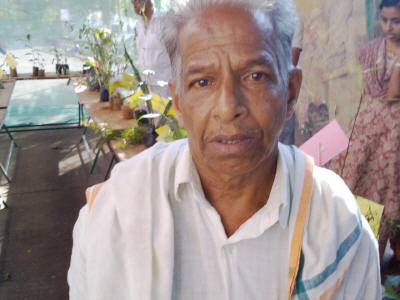A report on Harithamrutham, an exhibition on indigenous plants at Vatakara. Chanthukkutty, a life dedicated to conservation of medicinal plants educates the visitors.
While Banyan tree is considered as the king of trees, who is the queen; which are the ten members of Dashapushpam (ten flowers) family?
Chanthukutty has all the answers of these questions.
Recently, he has educated hundreds of visitors at Harithamritam, an exhibition organized to create awareness among people on indigenous plantations and eco-friendly products at Vatakara Town hall. Enthusiastic young children to experienced elders crowded there to hear his simple and informative narrative.
When speaking on Nalpamaram, the queen of trees, he explains the numerous curative nature and aromatic excellence of its essence which is widely used to cleanse the skin.
Poovankurunnu, Mukkutty, Muyalcheviyan, Thiruthaly, Uzhinja, Karukappullu, Cheroola, Vishnukranthi, Nilappana, Kanjannna (Kayyonni) are the members of Dashapusham, the divine name in medicinal plants. He says these plants signify ten Devata concept in Hindu Puranas.
“A combination of all the ten herbs in the form of paste, mixed in gruel is the best medicinal food for high immunization of human body. If you take this medicine once in a year, there is no need to worry about any diseases during that year.”
Besides that, he would provide you the details of medicinal properties of each plant.
Thezhuthama is a best medicine for the growth of new cells.
Sarpagandhi reduces the blood pressure.
You might have heard of Rama Thulasi and Krishna Thulasi. But, Chanthukkutty shows the third one, Vaikunta Thulasi.
Iruveli has been famous for relieving many serious illnesses.
Vatham Kolli as the name signifies will help to reduce Vaatham (Rheumatics.
Vallippala is best for the cure of Asthma.
The juice of Adalotakam is the best medicine for phlegm, especially for small kids.
When you look Chembarathy, Sarpapola and Thechy, the nostalgia of old gardens may enter our minds.
You might have heard of the beautiful Malayalam love song “Parijatham Thirumizhi Thurannu…”
The plant, Paarijatham, looks beautiful as its fragrance.
Ilanji, Maramulla, Sarpagandhi, Kadaladi, Jathy, Vellakkoova, Neermathalam, Munja, Naykurana, Payyana….the list and the benefits of the herbs goes as the flow of Chanthukutty’s informative talk .
Chanthukkutty

Over time, people have been ignoring the best plants in their homesteads. Present generations are mostly unaware of the value of the same. So instead of using available greens from one’s own homesteads, we now purchase commercially cultivated vegetables from markets. Unlike fresh, organic and safe domestic produce, these are applied with harmful pesticides and hormones. Chanthukutty’s words facilitate to think on this indigenous information.
In this current scenario, where people are simply attracted by the modern fast food culture, Chanthukutty’s lecture demonstrations are an eye opener, to both rural and urban mass. “If you take a handful of Tavara you will get a quarter glass of blood.” (Tavara is small green plant that grows in orchards. Its leaves are highly nutritious and delicious).
Chanthukutty has been conserving around 500 medicinal plants in his homestead at Koyilandy since thirty five years.
When asked on what made him to take this drive to dedicate his life for plants and trees, his answer was:
My life philosophy is based on the Rig-Veda verse:
“Which is the periphery of the existence of life in this earth?
Life will exist on this earth until you have healthy plants.”
He has inherited his medicinal knowledge from his mother, Chirutha who had been an expert in traditional herbal medicine. She had prescribed panacea for the health care of rural folk to get rid of many diseases, at free of cost.
He had been a best student and performed well in sports and games. In 1964, he got Two Star Certificate of National Physical Efficiency Test.
With a brilliant matriculation to his credit, Chanthukutty, dived in to explore the vast ocean of medicinal plants. He spent time learning almost all the authentic writings and available books on medicine and natural history and conducting independent research. While learning Hortus Malabaricus, he realized the wonders of most plants present in his own premise.
The unconditional support from his family also helped him to maintain the robust garden of medicinal herbs. His wife is also involved in watering the plants and looking after the organic vegetable farm. He has three children, one daughter and two sons.
During his journey with medicinal plants, he had to suffer domestic and financial worries. Still he holds on to his principle to protect the precious wealth of mankind.
His passion for plants, trees and a unique collection of the rare aromatic and medicinal plants are his wealth.
Presently, Chanthukutty is on another similar mission. He has been entrusted with a project of planting two lakh medicinal plants, by Shanthigiri Ashram authorities. With his youthful energy even at an age of 65; clubbed with commitment and passion for the purpose, the project would soon be another success story…


